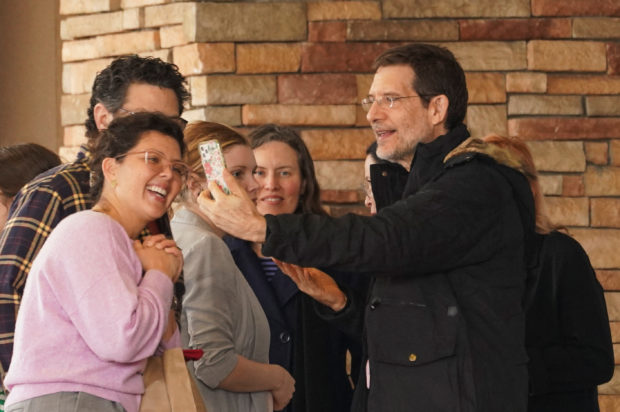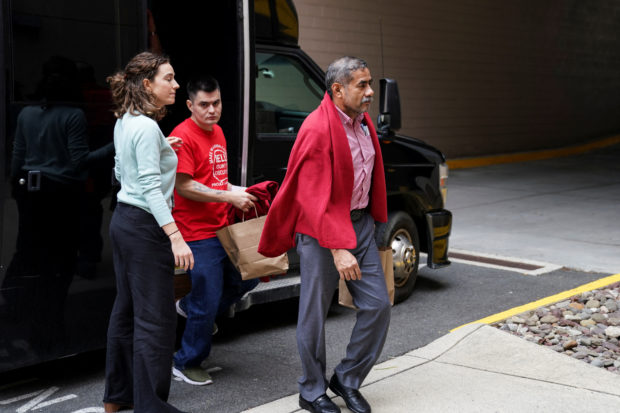Nicaragua releases over 200 political prisoners, most travel to US

Juan Lorenzo Holmann, one of the more than 200 freed political prisoners from Nicaragua, speaks on a phone outside a hotel after arriving in the United States at Dulles International Airport near Washington, US, February 9, 2023. REUTERS/Kevin Lamarque
MANAGUA/WASHINGTON — More than 200 political prisoners in Nicaragua were released and flown to the United States on Thursday, including five former presidential hopefuls and other leading critics of President Daniel Ortega, in what Washington described as a “constructive step” toward improving human rights.
A Nicaraguan judge denounced the 222 prisoners released as “traitors” in a televised statement, and said they had been “deported.”
Crowds of people waited to greet their loved ones at Dulles International Airport near Washington, waving flags and chanting “free!”, following the surprise move by the Nicaragua government.
A US official told Reuters Managua’s goal was to show its desire to improve relations with Washington that have long been frosty, and that Ortega’s government did not ask for anything in return.
In 2021, Washington imposed sanctions and denounced Ortega’s re-election as a “sham” after numerous opponents were jailed ahead of the vote, with journalists and religious figures also later imprisoned.
Article continues after this advertisementThe released prisoners will be allowed to enter the United States on emergency humanitarian grounds, the administration of President Joe Biden said in a note to Congress.
Article continues after this advertisement
A few of the more than 200 freed political prisoners from Nicaragua disembark from a bus after they arrived in the United States at Dulles International Airport in Virginia near Washington, US, February 9, 2023. REUTERS/Kevin Lamarque
‘Attacks against sovereignty’
Speaking on Nicaraguan radio, Vice President Rosario Murillo said Nicaragua had carried out the “expatriation and transfer of people who were sentenced for attacks against sovereignty.”
She added: “This sovereign decision of the Nicaraguan state has been taken in the supreme interest of our country, to live in harmony.”
Nicaragua’s government said it planned to change the law to allow it to strip the freed prisoners of their citizenship, which would effectively close off any future plans they might have of returning.
Among those freed were former presidential hopefuls Juan Sebastian Chamorro, Felix Maradiaga, Miguel Mora, Medardo Mairena and Arturo Cruz, as well as prominent student activist Lesther Aleman, a Nicaraguan judicial document showed.
Blinken said dual-citizen Michael Healy, who had been given a 13-year prison sentence, was also released.
About 100 people awaited their arrival at the airport, with many waving Nicaraguan flags and signs with the names of those released. Some sang a cherished national song, “My Nicaragua.”
Ariana Gutierrez Pinto, 28, said she was eager to be reunited with her 63-year-old mother, Evelyn Pinto, who had been released just in time to celebrate her birthday later this month.
“I’m super nervous,” the younger Pinto said. “There were days when I lost hope, but my father was always optimistic, the whole family was optimistic. And my mother was too. She never lost hope.”
On Twitter, the Nicaraguan University Alliance wrote: “Our friends have been freed,” referring to four students who were imprisoned following their participation in protests.
“Some of these individuals have spent years in prison, many of them for exercising their fundamental freedoms, in awful conditions and with no access to due process,” said a U.S. State Department spokesperson.
The release “marks a constructive step towards addressing human rights abuses in the country and opens the door to further dialogue between the United States and Nicaragua regarding issues of concern,” US Secretary of State Antony Blinken said.
In addition to the 222 individuals who went to the United States, two others were freed but chose not to travel, the State Department said.